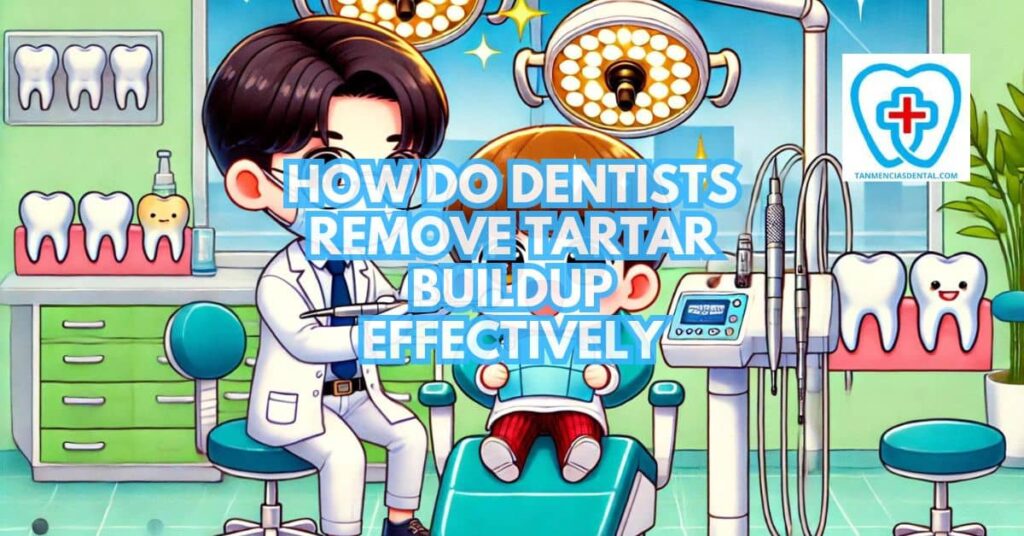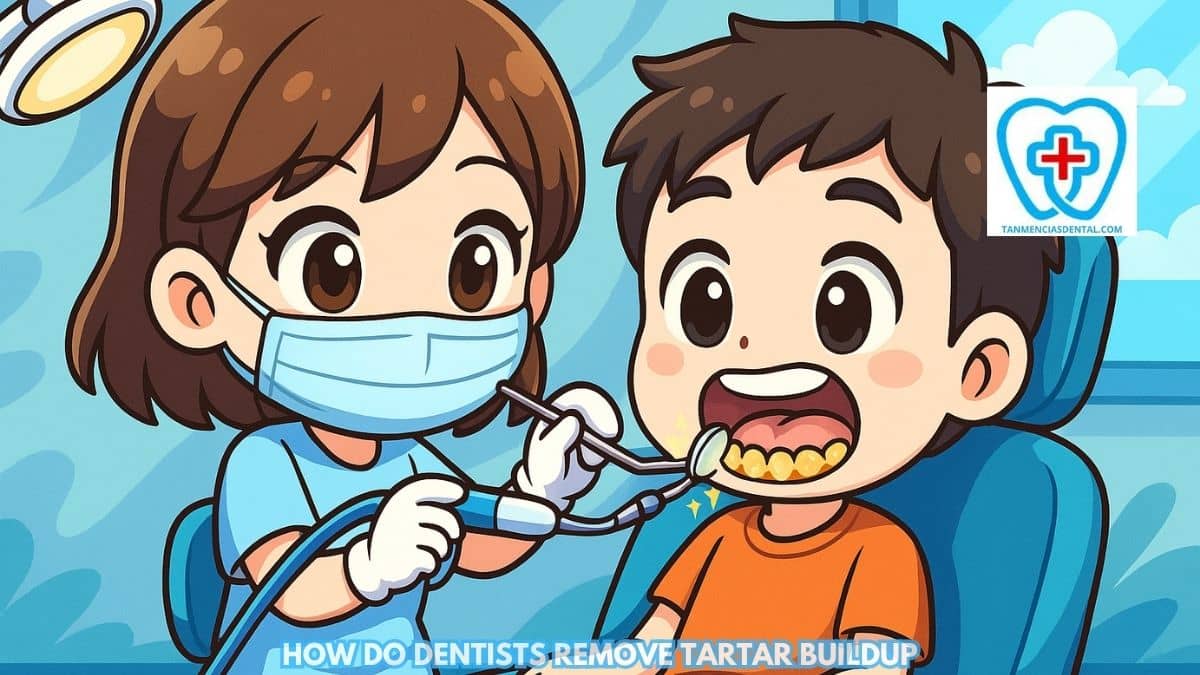Tartar, or calculus, is hardened plaque that sticks tightly to your teeth and gums, making it difficult to remove at home.
Once it forms, brushing and flossing can no longer clean it away, which is why many people wonder how do dentists remove tartar buildup safely and effectively.
This hardened layer gives bacteria a place to grow and can lead to gum disease if not treated.
Professional dental cleanings are the only way to completely remove tartar and protect your mouth from damage.
Understanding how dentists assess, clean, and care for your teeth can help you keep your smile healthy and prevent future buildup.
1. Before the Cleaning: How Dentists Examine Your Gums and Teeth
Before removing tartar, a dental professional begins by examining your mouth to check the health of your gums and teeth.
They perform a periodontal assessment, which helps identify signs of gum disease or infection.
Using a thin measuring tool called a probe, the dentist measures the pocket depths between your teeth and gums to find areas where dental plaque and bacteria may have collected.
A disclosing solution might be used to stain leftover plaque, showing spots that need more attention during cleaning.
The dentist also uses an explorer, a fine metal instrument, to feel for dental calculus, which is hardened plaque that cannot be removed by brushing alone.
If deeper deposits are suspected, bitewing X-rays are taken to view dental calculus hidden beneath the gumline or between teeth.
These images help ensure that all buildup is found before the cleaning begins.
Through this careful examination, the dental professional can plan the most effective way to remove tartar and protect your oral health.
🦷 How to Choose the Best Dental Care Center for Your Family
2. Don’t Let Tartar Take Over: The Risks of Buildup
If tartar is left untreated, it can cause a range of dental issues, from cavities to gum disease.
The presence of tartar irritates the gums, leading to inflammation and bleeding, which are early signs of gingivitis.
As tartar continues to accumulate, it can cause the gums to recede, exposing the roots of your teeth and making them more sensitive to temperature changes and prone to decay.
In severe cases, untreated tartar can lead to periodontitis, a condition that weakens the bones supporting your teeth.
Regular dental checkups and cleanings are essential to preventing tartar from escalating into serious oral health problems.
🦷 Building Community Partnerships through Dental Checkup Camps
3. The Dental Hygienist: Your Partner in Tartar Removal
Dental hygienists are skilled professionals trained to clean your teeth and remove tartar that can’t be reached by regular brushing.
They use special instruments to gently scrape away tartar from your teeth, especially in difficult areas like between the teeth and along the gumline.
Their role is crucial in maintaining your oral health, as they can detect areas where tartar has built up and remove it before it causes problems.
Hygienists also provide personalized advice on how to maintain good oral hygiene at home to prevent future tartar formation.
Seeing your dental hygienist regularly helps ensure your teeth stay clean and healthy between visits.
🦷 Best Mouthwash For Gingivitis: What to Look For and Avoid
4. Scaling Away the Problem: How Dentists Remove Tartar
Scaling is the main step in a dental cleaning that removes hardened plaque and tartar from the surface of your teeth.
During this process, the dentist or hygienist uses small instruments called scalers to scrape away buildup both above and below the gumline.
These tools come in different shapes to reach between teeth and around curved areas where plaque and tartar buildup often collect.
In some cases, an ultrasonic scaler is used, which produces gentle vibrations to loosen tartar while flushing it away with water.
The procedure is usually painless, though patients with sensitive teeth might feel slight pressure during scaling.
Removing this buildup is important because it prevents bacteria from irritating the gums or causing cavities.
Once the tartar is cleared, the surface of the teeth becomes smoother, which helps slow down future plaque accumulation.
Regular teeth cleaning appointments ensure that scaling removes all hidden deposits and keeps your mouth healthy.
🦷 How Long Is A Dentist Appointment?

5. Polishing for Perfection: Keeping Your Smile Sparkling
Once the scaling process is complete, polishing is the next step, designed to smooth out your teeth’s surface.
Polishing removes any residual plaque and stains left after tartar removal, giving your teeth a smooth, glossy finish.
Dentists use mildly abrasive paste and a rotating rubber cup to achieve this, making your teeth feel cleaner and look brighter.
This smooth surface also makes it more difficult for new plaque to stick, reducing the likelihood of future tartar buildup.
Polishing not only helps maintain a bright smile but also contributes to long-term oral health by keeping your teeth’s surface less prone to bacterial accumulation.
🦷 Is It Bad To Brush Your Teeth With Baking Soda?
6. Ultrasonic Power: How Technology Fights Tartar
Ultrasonic scalers are an advanced tool in the fight against tartar, using sound waves to break up stubborn deposits.
These devices work by sending high-frequency vibrations through a metal tip, effectively dislodging tartar from the teeth.
Water is used in tandem with the ultrasonic scaler to flush away the broken-up tartar and cool the area being treated.
Ultrasonic scalers are particularly effective for removing large amounts of tartar and are often more comfortable for patients than manual scraping.
This technology allows dentists to perform a thorough cleaning with precision, ensuring that even the most difficult tartar deposits are addressed.
🦷 Why Routine Dental Treatments Are Key to Avoiding Dental Emergencies
7. The Delicate Touch: Precise Tartar Removal
Some parts of the mouth, such as under the gums or near the roots, need careful attention during tartar removal.
Dentists work slowly in these sensitive spots to reach hidden buildup without damaging your teeth or irritating the gums.
They use small, curved instruments that allow them to clean precisely while keeping the tissue around each tooth safe.
This technique helps ensure that all hardened tartar is removed, even from tight or deep areas.
By using gentle movements, dentists can reduce soreness and promote faster healing after cleaning.
A precise and thoughtful approach protects your enamel, prevents further buildup, and keeps your mouth healthy.
🦷 Child Hates Brushing Teeth: Creating Positive Dental Habits
8. The Importance of Regular Cleanings: Preventing Tartar Buildup
Regular dental cleanings are a key step in preventing tartar buildup before it can cause serious damage to your teeth and gums.
By scheduling cleanings every six months, you ensure that any plaque missed during daily brushing is removed before it hardens into tartar.
Dentists use professional tools and techniques to clean hard-to-reach areas, leaving your mouth feeling fresh and free from harmful deposits.
Regular cleanings also give your dentist a chance to check for early signs of gum disease or other issues caused by tartar.
Consistent visits not only prevent problems but also contribute to maintaining a strong, healthy smile over time.
🦷 Are Electric Toothbrushes Sustainable? Worth the Hype for the Environment?
9. Brushing, Flossing, and More: Your Daily Tartar Defense
Daily oral hygiene plays a crucial role in preventing tartar from forming.
Brushing your teeth at least twice a day with fluoride toothpaste helps remove plaque before it can harden into tartar.
Flossing is equally important as it targets the spaces between your teeth where plaque tends to accumulate.
Adding an antibacterial mouthwash to your routine can further help reduce the bacteria that contribute to tartar buildup.
Maintaining these daily habits is your first line of defense in keeping plaque and tartar under control.
🦷 Discover the Benefits of Using an Electric Toothbrush: Worth the Switch?
10. Diet and Lifestyle: What You Eat and Do Matters
Your diet and lifestyle choices significantly impact how much tartar forms on your teeth.
Foods high in sugar and carbohydrates feed the bacteria that cause plaque, leading to increased tartar buildup.
Drinking plenty of water throughout the day helps wash away food particles and bacteria, preventing plaque from hardening.
Avoiding smoking and other tobacco products can also help, as they not only contribute to tartar but also stain teeth and increase the risk of gum disease.
Being mindful of what you eat and drink, as well as making healthy lifestyle choices, supports better oral health overall.
🦷 Basic Dental Needs in Marikina
11. At-Home Remedies: Limitations and Risks
While there are many popular at-home remedies claiming to remove tartar, they have limitations and risks.
Baking soda, for example, can help reduce plaque but is not effective against tartar that has already hardened.
Similarly, oil pulling may offer some benefits for oral hygiene, but it cannot eliminate tartar once it forms.
Relying on these methods without professional cleanings can leave tartar untreated, which may worsen oral health over time.
It’s essential to recognize that while home care is vital, professional dental cleanings are the only way to completely remove tartar.
🦷 Get Expert Dental Care at Tan-Mencias Clinic in Marikina
👨⚕️ Conclusion
To keep your smile healthy and tartar-free, a combination of daily care and regular dental visits is essential.
Professional tartar removal ensures that hardened plaque doesn’t have a chance to cause gum disease or other dental problems.
Along with routine cleanings, good brushing, flossing habits, and mindful lifestyle choices help keep tartar at bay.
Regular care not only protects your teeth but also helps preserve a bright, confident smile.
Taking preventive steps today ensures a healthier smile for years to come.
❔ FAQs
1. Can tartar damage my teeth if I don’t remove it?
Yes, tartar can harm both your teeth and gums if it is not removed.
It can cause gum inflammation, bleeding, and lead to gum disease over time.
In severe cases, it may result in bone loss or tooth decay.
2. How often should I visit the dentist for tartar removal?
Most people should see a dentist or hygienist every six months for a cleaning.
Some may need visits every three to four months if they build tartar quickly or have gum problems.
Your dentist can recommend the best schedule for your mouth.
3. Does tartar removal hurt?
Tartar removal is usually painless, but some people may feel mild pressure or sensitivity during cleaning.
If tartar is under the gums, the dentist may numb the area to make it more comfortable.
The gums might feel tender for a short time afterward.
4. Can I remove tartar myself at home?
No, once tartar has hardened, it cannot be safely removed at home.
Brushing and flossing help prevent tartar, but only a dentist or hygienist can remove it completely.
Trying to scrape it off yourself can injure your gums or damage your enamel.
5. What helps prevent tartar from forming again?
Good daily habits are the best prevention.
Brush twice a day with fluoride toothpaste, floss daily, and use mouthwash to reduce bacteria.
Eating a balanced diet and avoiding sugary foods also helps slow down tartar buildup between cleanings.
😁 Self-Promotion
Visit Tan-Mencias Dental Clinic in Parang, Marikina City, for top-quality dental care in a friendly and welcoming environment.
Our team is dedicated to helping you achieve a healthy, beautiful smile through personalized treatments.
If you have any questions or concerns, feel free to call us at 0917-145-1074, send us a message on Facebook, or use the contact form on our website.
We’re here to assist you with all your dental needs.
Let us help you maintain your best smile!

